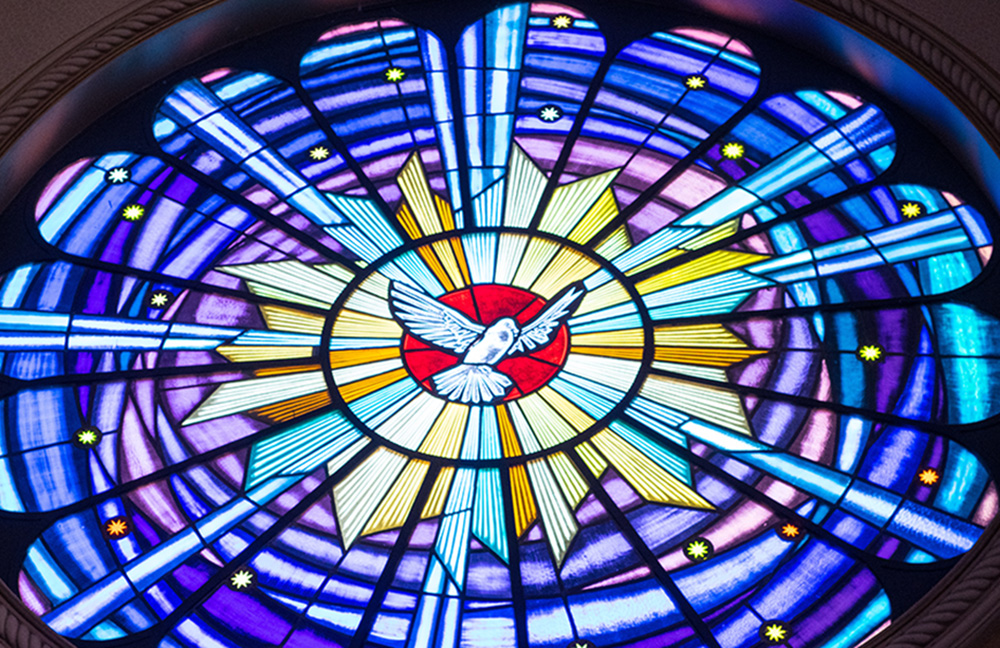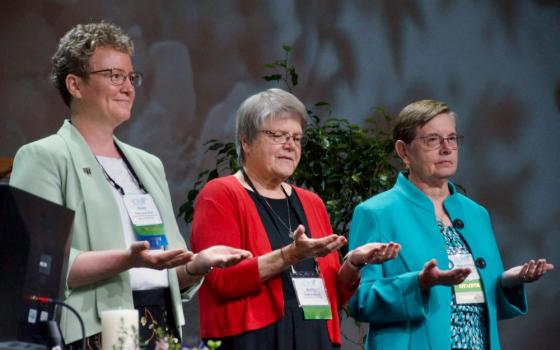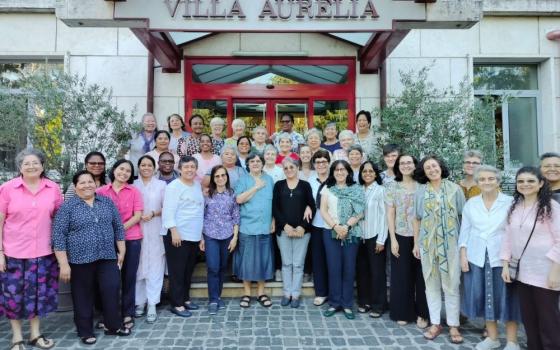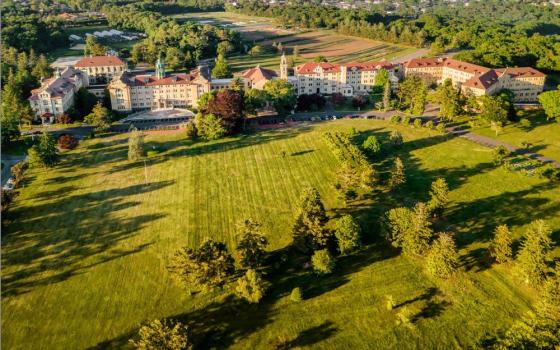
(Unsplash/Vidar Nordli Mathisen)
Over the hillside country Mary went,
Carrying Christ.
And all along the way the Christ she carried
Generously bestowed his grace on all she met.
She had not meant to tell she carried Christ.
She was content to hide his love for her,
But all about her glowed such joy
That into stony hearts love flowed,
And even to the unborn John,
Christ's grace was sent.
Long ago, I learned by heart this stanza of a longer poem by Ruth Mary Fox. It flows through my mind in sync with my steps every Advent. I can imagine the faith-filled, newly pregnant young Mary walking the hills to visit her older cousin, Elizabeth. Who could she tell about her extraordinary experience but one who had also been visited by God?
The God within so filled her being that she spread joy all about her.
"Over the hillside, Mary went." One realizes the power of poetry.
That womb presence of Jesus in Mary occurred once in human history. But an indwelling of the Spirit of Jesus resides in you and me. After Jesus the Christ returned to his Father, he kept his promise not to abandon his followers. He bestowed his divine spirit on his Apostles, visible as tongues of fire. Since that day, the abiding spirit of Christ dwells in every believer. The Holy Spirit within us is the source of our unending joy.
Advertisement
Abbot Dom Columba Marmion, an Irish Benedictine monk who was a prominent writer and teacher at the turn of the century, was abbot of several Benedictine monasteries in succession. He raised the spiritual level of each monastery by his kindness and deep spirituality. One of his most valued books, Christ, the Life of the Soul, is a permanent classic. He caught the wonder-filled concept of the indwelling of the Holy Spirit in these simple, glowing words: "Joy is the echo of God's life within us."
"Joy is the echo." One believes in the power of language.
In a universal application of the deep meaning of the indwelling of the Holy Spirit, theologian and scientist Franciscan Sr. Ilia Delio, expands its meaning in her 2021 book, The Hours of the Universe. In a chapter titled "Eucharist and God's Love," she muses: "You are infinitely near us, O God, within us, among us — the depth and breadth of our very existence. … In you, who is the Whole, we know ourselves to be whole. When you are present, we are one. … Only when we move toward one another do you emerge as the center of our lives."
The concept of reaching out to one another because we believe in the indwelling of God in all of us and in all of creation is one of Delio's contributions to a new theology of the universe. She states:
Always present, faithful, and empowering in love, God is absolute oneness in love and will not rest until we are joined together fully in love — not just every person but the whole world, the planet, the galaxies, the entire universe—when God is all in all, bound in a single embrace of love.
"A single embrace of love." One honors the power of contemporary theology.

(Unsplash/Mateus Campos Felipe)
Flannery O'Connor, the Catholic writer who lived most of her life in Georgia, usually created stories based in her Georgia milieu. She wrote only one story with a Catholic setting. It was published in May 1955, in Harper's Bazaar, and titled "A Temple of the Holy Ghost." (In that era, the translation of "Holy Ghost" had not yet become "Holy Spirit.")
The story tells of a weekend visit of two 14-year-old cousins to the home of an adult cousin who lives in a nearby town with her 12-year-old daughter. The girls are attending a Catholic boarding school. At dinner the first night, the two teenagers start acting silly, calling each other "Temple One" and "Temple Two." Questioned, one responded, still giggling, that Sister Perpetua had instructed them that, if any young man tried to take liberties with them, they should say, "Stop, sir. I am a Temple of the Holy Ghost!" And they laughed and laughed.
The mother didn't laugh. She called them "pretty silly. After all," she said, "that's what you are — Temples of the Holy Ghost."
At the table, the child was listening. "I am a Temple of the Holy Ghost, she said to herself, and was pleased with the phrase. It made her feel as if somebody had given her a present."
The next day, to entertain the guests, the mother called a friend and asked if her two grandsons would take the girls to the country fair that evening. They came with mouth organ and guitar and sang religious songs (they were going to be Church of God preachers) as love songs to the girls. The girls responded with "Tantum Ergo" in "convent-trained voices." One of the boys, perplexed, called out, "That must be Jew singing."
The child, not included in the gathering, but listening, became incensed that an ancient Latin hymn celebrating the Eucharist was used for entertainment. She shouted, "You big dumb Church of God ox!" and stomped away.
The Holy Spirit within us is the source of our unending joy.
The story moves on, hilarious, but deeply serious, as it illuminates the child's belief in spiritual realities. Just as the presence of God in the Eucharist has been real to the child since her First Communion, equally real is the presence of God within her — that she has just learned that weekend.
The story, with more complications that cause the child's belief to deepen, ends after the mother and child take the girls back to the convent school. They are just in time for afternoon Benediction. "You put your foot in their door and they got you praying, the child thought." But when she saw the glowing monstrance before her, she put aside her "ugly thoughts" and "her mind began to get quiet and then empty."
Back in the car and on the way home, "The child's face was lost in thought." She looked out the car window:
The sun was a huge red ball like an elevated Host drenched in blood and when it sank out of sight, it left a line in the sky like a red clay road hanging over the trees.
One feels the power of storytelling.
Poetry, language, theology, storytelling — all illuminate a deep Advent truth: each of us is a temple of the Holy Spirit. Over the hillsides of our lives, we can, as Mary did, carry to others the love and grace that only God can bestow.





